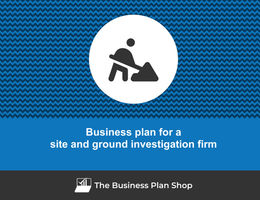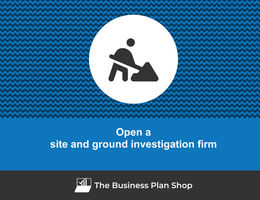How to create a financial forecast for a site and ground investigation firm?
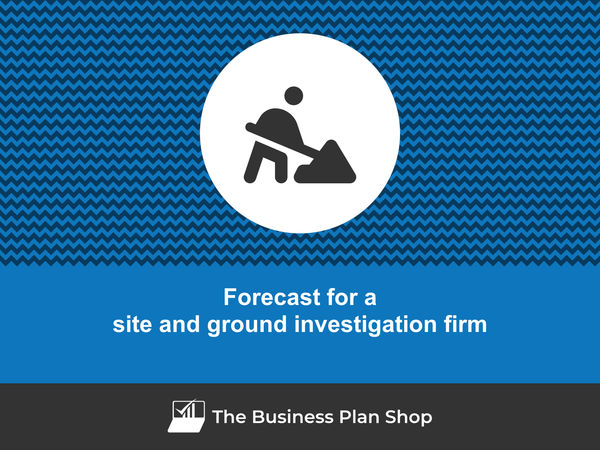
If you are serious about keeping visibility on your future cash flows, then you need to build and maintain a financial forecast for your site and ground investigation firm.
Putting together a site and ground investigation firm financial forecast may sound complex, but don’t worry, with the right tool, it’s easier than it looks, and The Business Plan Shop is here to guide you.
In this practical guide, we'll cover everything you need to know about building financial projections for your site and ground investigation firm.
We will start by looking at why they are key, what information is needed, what a forecast looks like once completed, and what solutions you can use to create yours.
Let's dive in!
Why create and maintain a financial forecast for a site and ground investigation firm?
The financial projections for your site and ground investigation firm act as a financial blueprint to guide its growth with confidence and ensure its long-term financial viability.
To create them, you will need to look at your business in detail - from sales to operating costs and investments - to assess how much profit it can generate in the years to come and what will be the associated cash flows.
During challenging market conditions, maintaining an up-to-date financial forecast enables early detection of potential financial shortfalls, allowing for timely adjustments or securing financing before facing a cash crisis.
Your site and ground investigation firm's financial forecast will also prove invaluable when seeking financing. Banks and investors will undoubtedly request a thorough examination of your financial figures, making precision and presentation essential.
Need a convincing business plan?
The Business Plan Shop makes it easy to create a financial forecast to assess the potential profitability of your projects, and write a business plan that’ll wow investors.

What information is needed to build a site and ground investigation firm financial forecast?
The quality of your inputs is key when it comes to financial modelling: no matter how good the model is, if your inputs are off, so will the forecast.
If you are building a financial plan to start a site and ground investigation firm, you will need to have done your market research and have a clear picture of your sales and marketing strategies so that you can project revenues with confidence.
You will also need to have a clear idea of what resources will be required to operate the site and ground investigation firm on a daily basis, and to have done your research with regard to the equipment needed to launch your venture (see further down this guide).
If you are creating a financial forecast of an existing site and ground investigation firm, things are usually simpler as you will be able to use your historical accounting data as a budgeting base, and complement that with your team’s view on what lies ahead for the years to come.
Let's now zoom in on what will go in your site and ground investigation firm's financial forecast.
The sales forecast for a site and ground investigation firm
From experience, it usually makes sense to start your site and ground investigation firm's financial projection with the revenues forecast.
The inputs used to forecast your sales will include the historical trading data of your site and ground investigation firm (which can be used as a starting point for existing businesses) and the data collected in your market research (which both new ventures and existing businesses need to project their sales forward).
Your site and ground investigation firm's sales forecast can be broken down into two key estimates:
- The average price
- The number of monthly transactions
To assess these variables accurately, you will need to consider the following factors:
- Seasonal demand: As a site and ground investigation firm, you may experience fluctuations in your average price and number of monthly transactions based on the time of year. For example, you may see an increase in demand during the spring and summer months when construction projects are more active. This could result in higher prices and more transactions during these months, while the colder winter months may see a decrease in demand and therefore a decrease in prices and transactions.
- Economic conditions: Economic factors such as interest rates, inflation, and overall market stability can also impact your business's average price and number of monthly transactions. During times of economic downturn, clients may be more price-sensitive and therefore negotiate lower prices, resulting in a decrease in your average price and potentially fewer transactions. On the other hand, during economic growth periods, clients may be willing to pay higher prices, resulting in an increase in both your average price and number of transactions.
- Competition: The level of competition in your market can also affect your business's average price and number of monthly transactions. If there are many other site and ground investigation firms in your area, you may need to lower your prices to remain competitive, resulting in a decrease in your average price. Additionally, if a new competitor enters the market, you may see a decrease in your number of transactions as clients have more options to choose from.
- Technological advancements: As technology continues to advance, it may impact the way your business operates and the services you offer. For example, if a new, more efficient technology is introduced to the market, it may reduce the time and cost of conducting site and ground investigations. This could result in a decrease in your average price as you may need to adjust your pricing to remain competitive. On the other hand, if your firm invests in new technology, it may allow you to offer more advanced services, resulting in an increase in your average price.
- Regulatory changes: Changes in regulations related to construction and development projects can also affect your business's average price and number of monthly transactions. For example, if there are new regulations that require more extensive site and ground investigations, you may be able to charge higher prices for your services. However, if there are changes that make it more difficult for clients to obtain necessary permits, it could lead to a decrease in your number of transactions.
Once you have a sales forecast in place, the next step will be to work on your overhead budget. Let’s have a look at that now.
Need a convincing business plan?
The Business Plan Shop makes it easy to create a financial forecast to assess the potential profitability of your projects, and write a business plan that’ll wow investors.

The operating expenses for a site and ground investigation firm
Once you know what level of sales you can expect, you can start budgeting the expenses required to operate your site and ground investigation firm on a daily basis.
Expenses normally vary based on how much revenue you anticipate (which is why, from experience, it is always better to start your forecast with the topline projection), and where your business is based.
Operating expenses for a site and ground investigation firm will include some of the following items:
- Staff Costs: This includes salaries, benefits, and other expenses related to your employees. This is typically the largest operating expense for a site and ground investigation firm.
- Accountancy Fees: You will need to hire an accountant to manage your financial records and ensure compliance with tax laws.
- Insurance Costs: As a site and ground investigation firm, you will need to carry various types of insurance such as general liability, professional liability, and workers' compensation.
- Software Licenses: You will need to purchase licenses for software programs that are essential for your firm's operations, such as CAD software or project management tools.
- Banking Fees: Your firm will have various banking fees, such as transaction fees, wire transfer fees, and overdraft fees.
- Office Rent: You will need to find a suitable office space to run your firm's operations. This could include rent, utilities, and other related expenses.
- Equipment Maintenance: Your firm will need to maintain equipment such as drilling rigs, surveying tools, and soil testing equipment to ensure efficiency and accuracy in your work.
- Marketing and Advertising: To attract clients, you will need to invest in marketing and advertising efforts, such as creating a website, attending industry events, and producing marketing materials.
- Training and Development: Your employees will need to undergo training and development to keep up with industry changes and advancements.
- Travel Expenses: Your firm may need to travel to different sites for investigations, which will incur expenses such as transportation, lodging, and meals.
- Professional Memberships and Subscriptions: To stay updated on industry developments and network with other professionals, you may need to pay for memberships and subscriptions to professional organizations and publications.
- Legal Fees: Your firm may need to hire a lawyer to help with contracts, disputes, or other legal matters.
- Office Supplies: Your firm will need to purchase office supplies, such as stationery, printer ink, and other essentials.
- Safety Equipment: As a site and ground investigation firm, you will need to invest in safety equipment for your employees, such as hard hats, safety glasses, and gloves.
- Vehicle Expenses: If your firm uses vehicles for fieldwork or transportation, you will need to cover expenses such as fuel, maintenance, and insurance.
This list will need to be tailored to the specificities of your site and ground investigation firm, but should offer a good starting point for your budget.
What investments are needed to start or grow a site and ground investigation firm?
Once you have an idea of how much sales you could achieve and what it will cost to run your site and ground investigation firm, it is time to look into the equipment required to launch or expand the activity.
For a site and ground investigation firm, capital expenditures and initial working capital items could include:
- Geotechnical Equipment: This includes items such as drilling rigs, soil testing equipment, and surveying tools. These are essential for conducting site and ground investigations and are typically large, expensive assets that require significant capital investment.
- Laboratory Facilities: A site and ground investigation firm may need to invest in a laboratory facility to test soil and water samples collected during the investigation process. This may include purchasing equipment such as ovens, balances, and sieves, as well as setting up a designated space for conducting tests.
- Vehicles: Depending on the size and scope of the firm, vehicles may be necessary for transporting equipment and personnel to and from investigation sites. These could include trucks, vans, or even specialized off-road vehicles for accessing remote locations.
- Office Space and Equipment: In addition to field equipment, a site and ground investigation firm will also need a designated office space for administrative tasks and client meetings. This may include purchasing or leasing office furniture, computers, printers, and other necessary equipment.
- Safety Gear and Personal Protective Equipment (PPE): As a firm conducting physical investigations, it is crucial to prioritize the safety of employees. This may include investing in PPE such as hard hats, safety glasses, and high visibility vests, as well as safety equipment for working at heights or in hazardous environments.
Again, this list will need to be adjusted according to the specificities of your site and ground investigation firm.
Need a convincing business plan?
The Business Plan Shop makes it easy to create a financial forecast to assess the potential profitability of your projects, and write a business plan that’ll wow investors.

The financing plan of your site and ground investigation firm
The next step in the creation of your financial forecast for your site and ground investigation firm is to think about how you might finance your business.
You will have to assess how much capital will come from shareholders (equity) and how much can be secured through banks.
Bank loans will have to be modelled so that you can separate the interest expenses from the repayments of principal, and include all this data in your forecast.
Issuing share capital and obtaining a bank loan are two of the most common ways that entrepreneurs finance their businesses.
What tables compose the financial plan for a site and ground investigation firm?
Now let's have a look at the main output tables of your site and ground investigation firm's financial forecast.
The profit & loss forecast
The forecasted profit & loss statement will enable you to visualise your site and ground investigation firm's expected growth and profitability over the next three to five years.
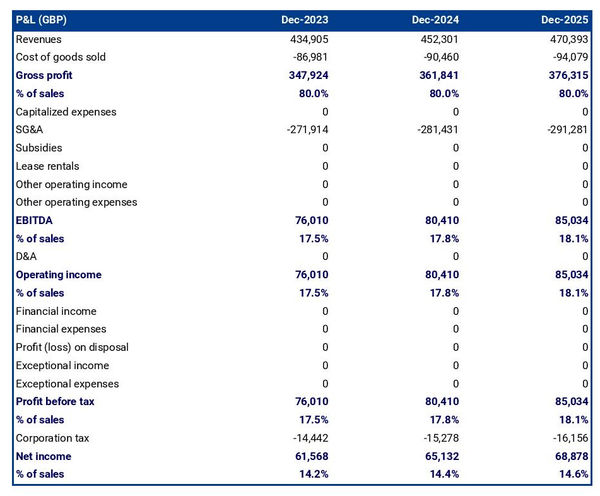
A financially viable P&L statement for a site and ground investigation firm should normally show:
- Sales growing above inflation
- Stable or expanding (ideally) profit margins
- A net profit
This will of course depend on the stage of your business: a new venture might be loss-making until it reaches its breakeven point in year 2 or 3, for example.
The projected balance sheet
Your site and ground investigation firm's forecasted balance sheet enables you to assess your financial structure and working capital requirements.
It is composed of three types of elements: assets, liabilities and equity:
- Assets: represent what the business owns and uses to produce cash flows. It includes resources such as cash, equipment, and accounts receivable (money owed by clients).
- Liabilities: represent funds advanced to the business by lenders and other creditors. It includes items such as accounts payable (money owed to suppliers), taxes due and loans.
- Equity: is the combination of what has been invested by the business owners and the cumulative profits and losses generated by the business to date (which are called retained earnings). Equity is a proxy for the value of the owner's stake in the business.
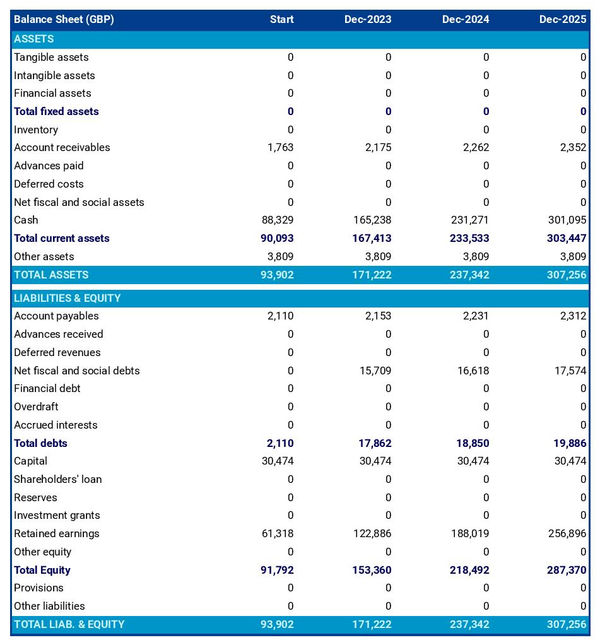
The cash flow forecast
Your site and ground investigation firm's cash flow forecast shows how much cash your business is expected to consume or generate in the years to come.
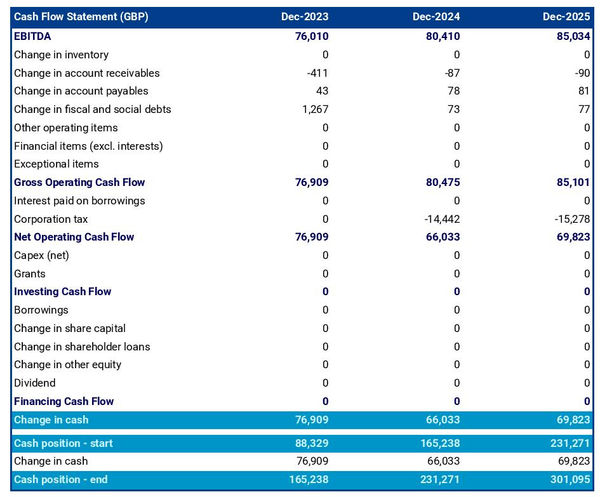
It is best practice to organise the cash flow forecast by nature to better explain where cash is used or generated by the site and ground investigation firm:
- Operating cash flow: shows how much cash is generated by the operating activities
- Investing cash flow: shows how much will be invested in capital expenditure to maintain or expand the business
- Financing cash flow: shows if the business is raising new capital or repaying financiers (debt repayment, dividends)
Keeping an eye on (and regularly updating) your site and ground investigation firm's cash flow forecast is key to ensuring that your business has sufficient liquidity to operate normally and to detect financing requirements as early as possible.
If you are trying to raise capital, you will normally be asked to provide a monthly cash flow forecast in your site and ground investigation firm's financial plan - so that banks or investors can assess seasonal variation and ensure your business is appropriately capitalised.
Need a convincing business plan?
The Business Plan Shop makes it easy to create a financial forecast to assess the potential profitability of your projects, and write a business plan that’ll wow investors.

Which tool should you use to create your site and ground investigation firm's financial projections?
Building a site and ground investigation firm financial forecast is not difficult provided that you use the right tool for the job. Let’s see what options are available below.
Using online financial projection software to build your site and ground investigation firm's forecast
The modern and easiest way to build a forecast is to use professional financial projection software such as the one we offer at The Business Plan Shop.
There are several advantages to using specialised software:
- You can easily create your financial forecast by letting the software take care of the financial calculations for you without errors
- You have access to complete financial forecast templates
- You get a complete financial forecast ready to be sent to your bank or investors
- You can easily track your actual financial performance against your financial forecast, and recalibrate your forecast as the year goes by
- You can create scenarios to stress test your forecast's main assumptions
- You can easily update your forecast as time goes by to maintain visibility on future cash flows
- You have a friendly support team on standby to assist you when you are stuck
- It’s cost-efficient and much cheaper than using an accountant or consultant (see below)
If you are interested in this type of solution, you can try our forecasting software for free by signing up here.
Hiring a financial consultant or chartered accountant
Hiring a consultant or chartered accountant is also an efficient way to get a professional site and ground investigation firm financial projection.
As you can imagine, this solution is much more expensive than using software. From experience, the creation of a simple financial forecast over three years (including a balance sheet, income statement, and cash flow statement) is likely to start around £700 or $1,000 excluding taxes.
The indicative estimate above, is for a small business, and a forecast done as a one-off. Using a financial consultant or accountant to track your actuals vs. forecast and to keep your financial forecast up to date on a monthly or quarterly basis will naturally cost a lot more.
If you choose this solution, make sure your service provider has first-hand experience in your industry, so that they may challenge your assumptions and offer insights (as opposed to just taking your figures at face value to create the forecast’s financial statements).
Why not use a spreadsheet such as Excel or Google Sheets to build your site and ground investigation firm's financial forecast?
Creating an accurate and error-free site and ground investigation firm financial forecast with a spreadsheet is very technical and requires a deep knowledge of accounting and an understanding of financial modelling.
Very few business owners are financially savvy enough to be able to build a forecast themselves on Excel without making mistakes.
Lenders and investors know this, which is why forecasts created on Excel by the business owner are often frowned upon.
Having numbers one can trust is key when it comes to financial forecasting and to that end using software is much safer.
Using financial forecasting software is also faster than using a spreadsheet, and, with the rise of artificial intelligence, software is also becoming smarter at helping us analyse the numbers to make smarter decisions.
Finally, like everything with spreadsheets, tracking actuals vs. forecasts and keeping your projections up to date as the year progresses is manual, tedious, and error-prone. Whereas financial projection software like The Business Plan Shop is built for this.
Need a convincing business plan?
The Business Plan Shop makes it easy to create a financial forecast to assess the potential profitability of your projects, and write a business plan that’ll wow investors.

Use our financial projection templates for inspiration
The Business Plan Shop has dozens of financial forecast templates available.
Our examples contain a complete business plan with a financial forecast and a written presentation of the company, the team, the strategy, and the medium-term objectives.
Whether you are just starting out or already have your own site and ground investigation firm, looking at our financial forecast template is a good way to:
- Understand what a complete business plan should look like
- Understand how you should model financial items for your site and ground investigation firm
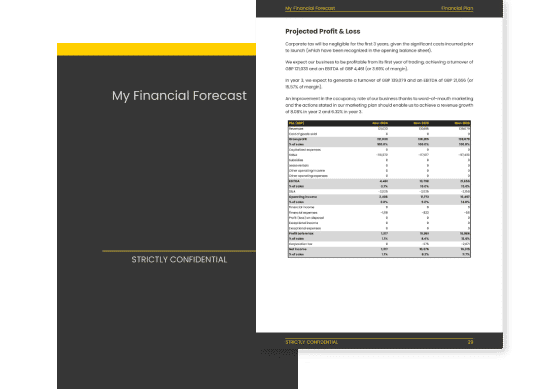
Takeaways
- A financial forecast shows expected growth, profitability, and cash generation metrics for your site and ground investigation firm.
- Tracking actuals vs. forecast and having an up-to-date financial forecast is key to maintaining visibility on your future cash flows.
- Using financial forecasting software is the modern way of creating and maintaining financial projections.
We hope that this guide helped you gain a clearer perspective on the steps needed to create the financial forecast for a site and ground investigation firm. Don't hesitate to contact us if you have any questions!
Need a convincing business plan?
The Business Plan Shop makes it easy to create a financial forecast to assess the potential profitability of your projects, and write a business plan that’ll wow investors.

Also on The Business Plan Shop
- Financial forecast example
- How to project revenues for a business?
- Financial forecast for a business idea
Know someone who runs a site and ground investigation firm? Share our business guide with them!


